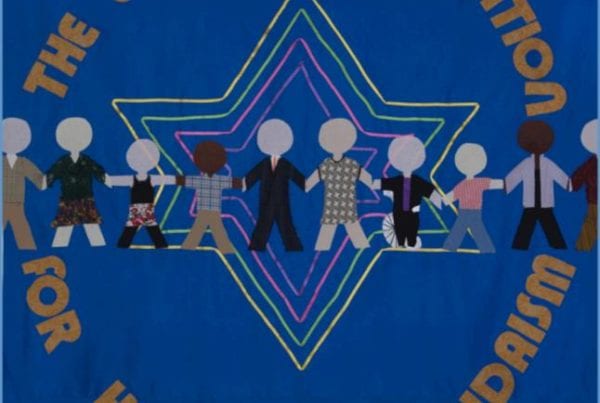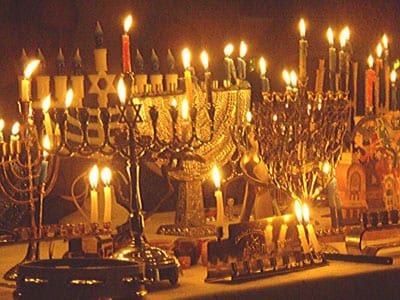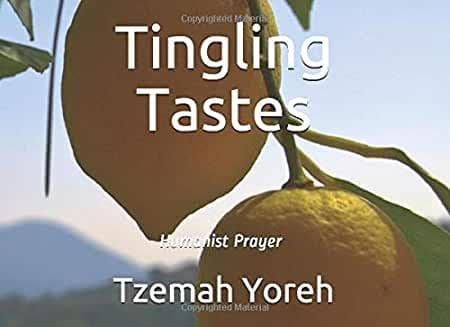Self-Reflection Essay
Matt Rand
(Originally given on the occasion of his conversion, February 15, 2017)
Ten years ago if someone had told me I’d become Jewish, I definitely wouldn’t have believed them. Before attending Shabbat at Temple Hillel in Valley Stream with Heather a year ago, I had never been to a religious service of any faith. Not many people in my hometown in Maine were of the God-fearing variety, and of those who were, only a small portion were Jews. Growing up in that environment, I was apathetic towards religion. I had a cursory understanding of its importance to so many people across the country and the world, but it played no role in my life.
That changed over the last few years as my relationship with Heather progressed. In celebrating the holidays with her family, I came to understand that the importance of these events goes far beyond the candles, the latkes, the challah, the shofar, or fasting. It’s about reinforcing ties to family, community, and those who came before us. However, you could say those things about almost any holiday of any faith, and that’s what made it difficult for me to fully embrace Judaism. Having grown up irreligious, I know from experience that one doesn’t need organized religion to feel a strong bond with family or have an appreciation for the past. For me to feel truly connected and inspired by Judaism, there had to be deeper meaning, a greater purpose, a more fruitful endeavor to undertake.
I’m glad I found Humanistic Judaism and Rabbi Schweitzer. During the nine months that I studied with him I discovered how Jewish identity can encompass so much more. For me, this period of discovery has been largely intellectual in nature, as I read several books on Jewish history, life cycle events, culture, the development and evolution of Jewish holidays, and humanistic interpretations and expressions of Judaism. I’ve discovered that opening my mind to some of the key themes in Jewish history has mirrored the intellectual growth I’ve experienced since leaving the bubble of Tufts University and joining the real world. In fact, to fully grasp the depth and breadth of this journey, I had to think back to experiences in my hometown.
Cape Elizabeth, Maine is an idyllic seaside community consisting of about 96 percent White Anglo-Saxon Protestant, wealthy, happy families. The public school system is among the best in New England, and opportunities for academic, athletic, and social endeavors are almost limitless. Life was certainly good, and I was totally clueless about how easy I had it. I thought that’s how the vast majority of children in this country grow up. Unsurprisingly, notions of inequality, white privilege, and social justice were relatively foreign to me. Maybe I heard them mentioned by a few outspoken peers in history classes now and then, but I never engaged with their meaning.
During my time at Tufts, I couldn’t make it through a day without hearing those terms. They annoyed me, to say the least. In fact, I’d often wish the loudmouth bleeding-hearts who uttered them would just be quiet. That sounds awful, and it was a deplorable mindset to have, but that was my initial reaction to the leftist onslaught. By the end of my Tufts career, I was desensitized to that sort of language. It didn’t bother me anymore, but I still hadn’t fully engaged with the ideas, let alone begun to embrace them.
Looking back on it, I think I needed to see it for myself. I couldn’t just take the word of a bunch of haughty white kids. Leaving the Tufts bubble allowed me to do that. My first job was in DC, and like many first jobs, the pay wasn’t great. I couldn’t afford to live in a region of the metro area where I’d be surrounded by other college-educated whites. In fact, in the apartment complex in which I ended up living for almost two years, I never saw someone like me. Not a single WASP.
Below me was a Hispanic family of five living in a one-bedroom apartment. Next door, a Pakistani family of four in a space the same size as mine. Each morning, I’d ride the city bus with predominantly African-Americans, many of them women juggling multiple small children. They always got off in the most squalid section of town. I couldn’t be sure what they’re final destination was, but it certainly didn’t seem like day care or a play date. It made me think about how different my life would have been if I were those little kids. How would I have turned out if my two siblings and I grew up in a one-bedroom apartment, had no place to play, and attended underfunded urban schools? Not so great is my only conclusion.
On a single weekend long run, I’d also witness the de facto segregation that characterizes many American cities. In Old Town Alexandria, I’d see only white people as I ran past beautiful riverfront townhomes. A half mile later, rows of tiny multi-family brick residential units in disrepair housed only blacks. Then I’d pass a couple high-rise apartment buildings swarming with Orthodox Jews. You’d have to be blind to not notice the inequality and segregation. The same themes are present here in New York too. Most mornings I look out our bedroom window and see kids, mostly Hispanic, walking alone through the urban jungle to school. Again, it makes me wonder how different things would have been for me if I had attended P.S. 65 in Ozone Park rather than Cape Elizabeth High School.
At the same time, I realize that those kids and the ones in my DC apartment complex have it much better than so many others. Over the last few years, just by watching and reading more news and opening my eyes and mind to certain issues, particularly the ones that have no direct impact on me, I’ve become more in tune with societal challenges. In a sense, the last four years of my life have been a crash course in the true character of this country and the world. Equality of opportunity is a myth, there is liberty and justice for some, but not all, and the American Dream remains merely a dream for so many. I now better understand my place in society. I know how easy my life has been compared to most, and how I’ve had every advantage based on social and economic constructs. It certainly makes me feel a bit guilty, and it has also made me realize the only way I can meaningfully contribute to the world is to help the disadvantaged, whether it be through community action, charity, or at the very least, lending an ear, and showing sympathy and compassion for the struggles they face.
The experience of the Jewish people, is the perfect illustration of how important it is to embody these qualities, and what can happen if society looks the other way in the face of injustice. From slavery to exile to economic marginalization to relentless persecution to genocide, the last few thousand years haven’t been kind to the Jewish people. It’s no surprise that tzedakah, tzedek, and tikkun olam – charity, justice, and repairing the word – are salient elements of Judaism’s fabric. For Jews, tzedakah is not an act of benevolence or generosity, it’s a moral obligation, an act of justice and righteousness. It goes hand in hand with the notion of repairing the world, or tikkun olam, which has been embedded in the Jewish canon since the rabbinic period in the third century C.E. Of course, for Humanistic Jews, validation from a higher authority isn’t a prerequisite for such actions and ideals. We impose them on ourselves.
To me, embracing those essential values goes hand in hand with being a Jew. They demonstrate that you know where you came from, what your ancestors endured, and the hardships that so many Jews still face. In embodying these humanitarian elements of Judaism, you’re also acknowledging that history does sometimes repeat itself – society doesn’t always learn from mistakes. Injustice and discrimination toward minorities are not a thing of the past. They’re alive and well, and perceptive Jews know that standing up for the disadvantaged and downtrodden, regardless of faith, race, sexual orientation or anything else we use to divide ourselves, is imperative to the overall health of our society. In that light, tzedakah, tzedek, and tikkun olam are Jewish traditions I’m honored to uphold.
Thinking about traditions brings me back to the holidays. The traditions we maintain on annual religious celebrations are of a very different nature than tzedakah and tikkun olam. In general, they’re things we do once per year because we’ve always done them, and our parents did them, and our grandparents did them. There’s nothing wrong with that, and as I’ve mentioned earlier, these traditions reinforce our bonds with family, community, and our ancestors. A tradition like tikkun olam, on the other hand, looks more toward the future than the past. It’s also a perpetual responsibility, rather than a once-per-year custom.
In learning about humanistic interpretations of Jewish holidays, I’ve discovered that these days of celebration can also serve as reminders to uphold the important responsibility of tikkun olam. Yom Kippur will be a day of self-reflection; a time to think about what I can do better for my family, the community, and society. How can I make a difference in the lives of not only people close to me, but also those who don’t have the means to help themselves.
Sukkot will make me think about my relationship to the environment, and on a larger scale, our planet. I look forward to building and spending time in a sukkah during the fall festival, and using the experience as a springboard to reflecting on how humanity impacts our climate and the natural world. There’s certainly no shortage of challenges for society in this realm, and Sukkot can serve as a reminder of the immense responsibility shouldered by my generation and the next.
Passover celebrates the rediscovery of human dignity; the escape from slavery in Egypt, or fleeing the shtetls and pogroms of Europe in search of a better life. For us, it’s a time to be thankful for the intrepid endeavors undertaken by those before us; the people who left behind everything they’d ever known in hopes of improving their lot and that of future generations. People like Heather’s great grandfather, Joseph Schwartz, a successful German businessman who spent a year in a concentration camp near Berlin before his wife, Selma, secured the extensive documentation required for the family of five to emigrate to the U.S. in 1939. Joseph and Selma, along with so many other Jewish families, had the odds stacked against them, but steadfast determination and a willingness to take matters into their own hands facilitated their reversal of fortune. It’s a timeless lesson for us and the generations to come.
The notion that one has the ability to create positive change, to ascend from calamity to prosperity, from darkness to light, is undoubtedly a meaningful message. While sharing Joseph and Selma’s story at the Seder table is living proof of it, the celebration of Hanukah could be viewed as a symbolic reminder. Lighting candles when the days are shortest reminds us there’s light at the end of the tunnel. Much like fire brings us heat and light when it’s cold and dark, people have the power to create hope from despair, triumph from failure. The world certainly needs that sort of attitude from us right now.
So in essence, the Jewish holidays can remind us of our inherent inner strength and the positive impact we can have on our loved ones, our communities, those less fortunate than us, the local environment, and our planet. That’s inspiring, rewarding, and meaningful; exactly what I was missing before my experience with Rabbi Peter Schweitzer and the City Congregation.
I didn’t realize that the intellectual development I’ve undergone in my formative years outside the ignorant bliss of Cape Elizabeth or the leftist echo chamber at Tufts could fit so seamlessly with my embracing Judaism and Jewish identity. However, the merging of these two experiences has revealed that there’s a relevant and fulfilling place for me among the Jewish people, and so today, I’m very proud to call myself a Jew.



